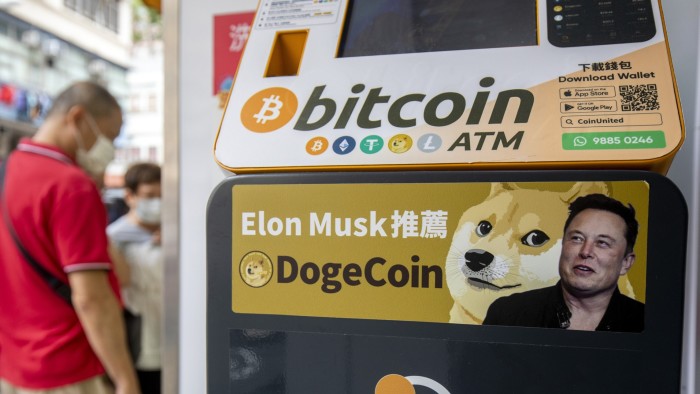Almost every month, Zhang travels from Shenzhen’s Futian district to a shopping mall in Hong Kong’s business district filled with fast food restaurants and several vacant stores to buy cryptocurrencies.
During a trip in June, the 27-year-old, who does “a little bit of everything that makes money” in his day job, exchanged cash for USDT worth about 10,000 to 20,000 RMB ($1,380 to $2,760). USD.
Zhang, who declined to give his full name due to sensitivity to crypto transactions on the mainland, said having a digital currency is convenient for “sending money to other places,” adding, “You can use it whenever you need it. “We will be making a 90-minute cross-border trip,” he added.
Cryptocurrency trading is illegal on the mainland, and the Chinese government has also banned foreign exchanges from providing services to domestic customers over the internet. However, crypto trading is legal in Hong Kong, and the city aims to become a hub for digital asset trading.
Less regulated brick-and-mortar crypto shops are spreading throughout the city’s tourist and shopping districts. These stores are thriving due to a surge in demand from mainland Chinese travelers and ambiguity over their regulatory status. Its main attraction is that customers can easily purchase digital assets with cash without revealing the source of the money or their identity.
In contrast to the strict licensing rules drafted for online exchanges in the city’s drive to become a hub for crypto-asset trading, these over-the-counter cryptocurrency stores allow customers to receive lighter checks, or in some cases You can buy large amounts of cryptocurrencies with a check of zero.
Before China and Hong Kong fully reopened their shared border in February, mainland Chinese customers accounted for “less than 5 percent” of CryptoHK, an OTC cryptocurrency company with two branches in the city, the founder said. Marton Lamb said. “Right now it’s probably about half full,” he said.
Roger Lee, co-founder of One Satoshi, a crypto store with nine branches in Hong Kong, said his company’s overall trading volume from January to May was up about 20-25% compared to the same period last year. He said he did. He expected trading to rise 35-40% for the year.
Mr Lee said he was not accepting clients from the mainland due to concerns about the Chinese government’s ban on cryptocurrencies, but after the city announced plans to become a crypto asset hub in October, widespread belief in Hong Kong’s crypto industry has increased. He was optimistic that restrictions would be eased as expected.
“I think about 30 percent of our new inquiries actually come from mainland China customers,” Lee said. “What we are advising them is that they will be able to do business with us soon. Perhaps the regulatory situation in China will change,” he said.
In June, Hong Kong introduced a new regime for virtual currency exchanges that requires all online platforms operating in the city to apply for a license.
But unlike other jurisdictions such as the United States and Singapore, which have cracked down on cryptocurrencies following the collapse of FTX and other well-known exchanges, Hong Kong is seeking to foster the growth of cryptocurrencies.
Even with the new regulations, most OTC stores are still outside the jurisdiction of the Hong Kong Securities and Futures Commission.
“New regulations will continue to be considered by the government,” Elizabeth Wong, the commission’s head of fintech, said at a briefing last month.
Carlton Lai, head of blockchain research at Daiwa Capital Markets, said OTC stores are primarily used as an easy way to inject funds into unlicensed online exchanges intermittently.
“There seem to be more[stores]in Hong Kong than elsewhere because these businesses tend to be largely unregulated and easy to start with sufficient capital,” he said. There is,” he added.
Some shops welcome increased regulation in this area. “Having regulation is great for the development of our industry,” said David Huang, whose business card reads “Crypto Explorer” for OTC crypto platform OTCXpert.
The company opened a store in Chongqing Mansions in April. Chungking Mansions is a vast, densely populated building in Kowloon, home to immigrant communities from all over Asia.
OTCXpert’s “get to know your customer” process included asking first-time customers for identification before allowing them to trade, Huang said.
Other stores don’t ask customers to show ID, instead promoting slogans like “No KYC required” and “Apply in as little as 10 minutes” on the OTC store’s website.
This means that online platforms seeking to obtain licenses to trade cryptocurrencies to retail customers will not be subject to the full investor protection checks required.
“Government regulators haven’t said anything about what we have to do,” Huang said of over-the-counter stores, adding that having clear guidance is “very important.”
Recommended
However, the lack of oversight of Hong Kong’s OTC shops and its proximity to mainland China, which remains the world’s fourth-largest crypto trading market in 2022, remain attractive to Chinese nationals who are still drawn to the asset class. said the customers.
“People are very sensitive in China because they (Beijing) banned it,” said David, a Shanghai-based research consultant who was in Hong Kong for the first time since the pandemic began to buy cryptocurrencies. spoke. He declined to give his last name for fear of retaliation upon his return to China.
“But so far I haven’t used it to move money. I just hope the economy improves so I can pay for my very expensive apartment.”

